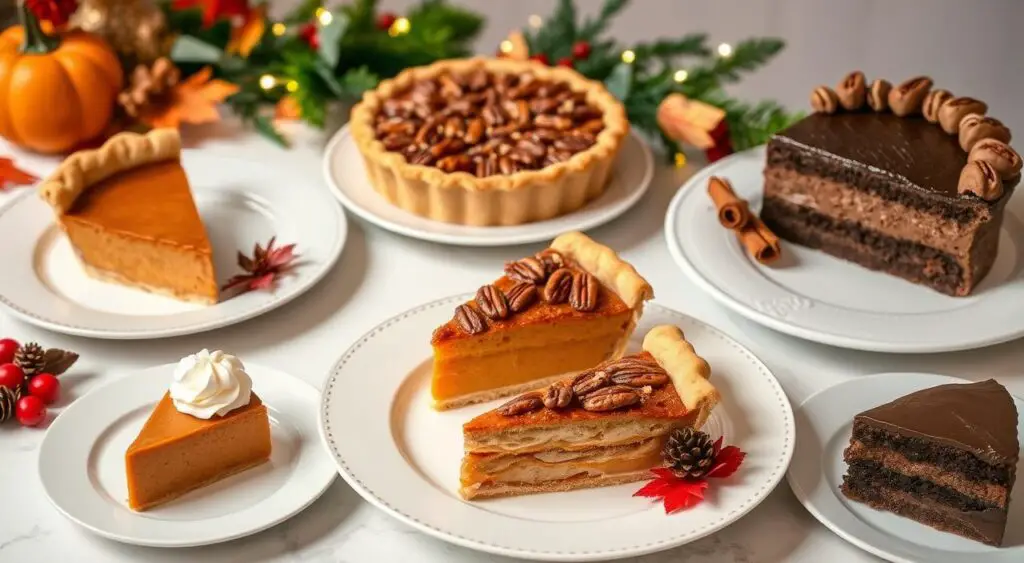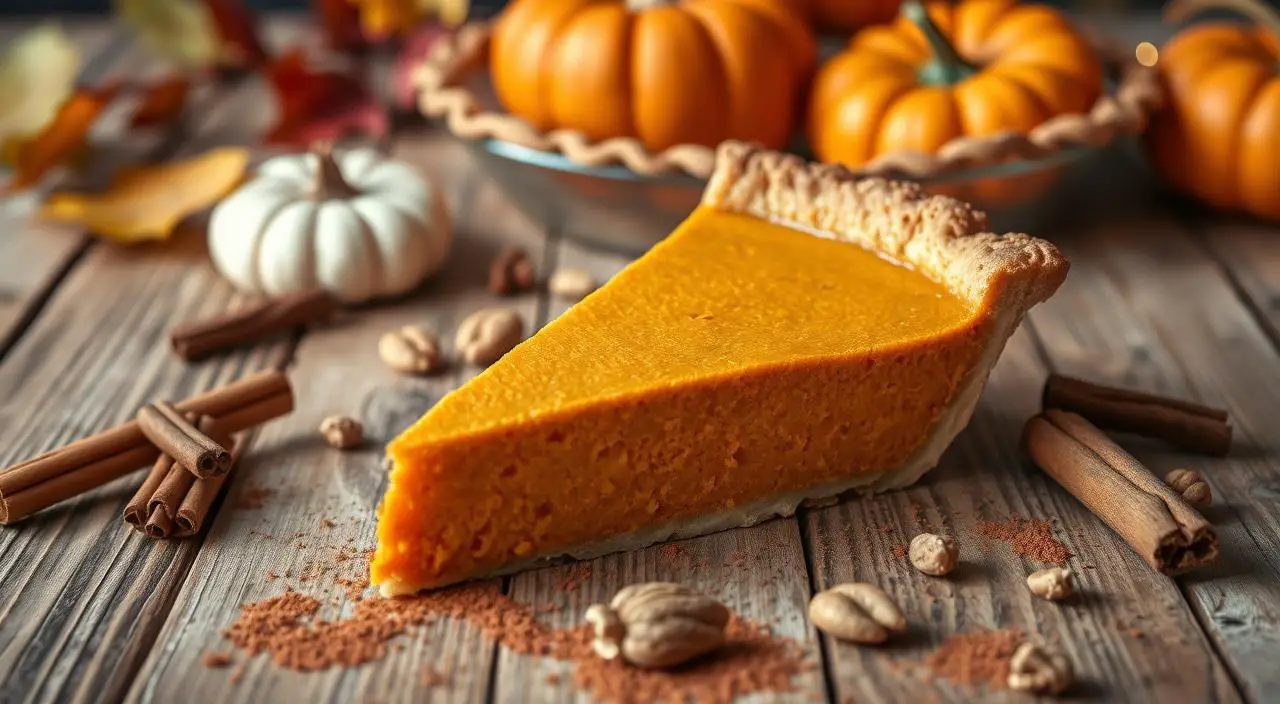Pumpkin pie is a favorite at Thanksgiving, but is it good for you? This classic dessert has a mix of good and bad nutrients. It makes people question if they should feel guilty or not when eating it1.
One slice of pumpkin pie has 252 calories, 34g of carbs, 6g of protein, and 9g of fat1. It has fewer calories than apple pie but more protein. This makes pumpkin pie a slightly better choice1. But, its healthiness really depends on the ingredients and how much you eat.
Key Takeaways
- Pumpkin pie has a complex nutritional profile, with both healthy and less healthy components.
- Pumpkin is a rich source of fiber, carotenoids, and potassium, which offer health benefits.
- The sugar and fat content of pumpkin pie can make it a less healthy choice, depending on portion size and ingredient quality.
- Comparing pumpkin pie to other holiday desserts can help determine its relative healthiness.
- Choosing high-quality, homemade pumpkin pie over store-bought options can make a difference in its nutritional value.
The Nutritional Profile of Traditional Pumpkin Pie
Pumpkin pie is a favorite holiday dessert. But, its nutritional value is often questioned. Let’s explore the calorie, macronutrient, and micronutrient content of a typical slice2.
Calories and Macronutrients
A slice of pumpkin pie has 316 calories. It contains 14 grams of fat, 7 grams of protein, and 41 grams of carbs2. This makes it a high-calorie and high-carb dessert. However, it has a good amount of protein.
Vitamins and Minerals Content
Pumpkin pie is packed with vitamin A. One cup of canned pumpkin gives over 200% of the daily recommended intake3. It also has potassium, vitamin C, and other important vitamins and minerals4.
Sugar and Fat Content
A slice of pumpkin pie has 26 grams of sugar, with 19 grams of added sugars2. The fat mainly comes from the pie crust, increasing calories and fat2. For comparison, a slice of apple pie has 411 calories and 19 grams of fat2.
| Nutrient | Pumpkin Pie (1 slice) | Apple Pie (1 slice) |
|---|---|---|
| Calories | 3162 | 4112 |
| Fat (g) | 142 | 192 |
| Protein (g) | 72 | 3.72 |
| Carbohydrates (g) | 412 | 572 |
| Fiber (g) | 22 | 22 |
| Sugar (g) | 262 | N/A |
Pumpkin pie is a mix of good nutrients but high in calories, sugar, and fat. Enjoy it in moderation during the holidays2.
Health Benefits of Pure Pumpkin
Pumpkin is a superfood that’s packed with nutrients. It has only 30 calories and 1 gram of protein in a cup of raw pumpkin. Canned pumpkin without salt has about 83 calories and 2.7 grams of protein5. It’s full of vitamins and minerals like Vitamin A, B1, B2, B3, B5, B6, B9, C, D, E, and K. It also has iron, copper, manganese, and potassium5.
Pumpkin is great for your digestive health and weight management. It has up to 7 grams of fiber per cup5. It’s also rich in beta-carotene, which fights cancer and keeps your eyes healthy6. Plus, it has lots of potassium, which helps balance sodium and might lower blood pressure5.
Eating pumpkin is good for your skin. It has beta-carotene, vitamin C, and oils that moisturize and reduce inflammation5. The antioxidants in pumpkin also protect cells from damage, which could lower the risk of diseases like cancer and dementia6.
Pumpkin is a great addition to any diet because of its fiber, vitamins, minerals, and antioxidants56.
The Role of Beta-Carotene in Pumpkin Pie
Pumpkin’s orange color comes from beta-carotene, a strong antioxidant4. One cup of canned pumpkin has 209% of the daily vitamin A you need4. This nutrient helps fight cancer, keeps your eyes healthy, and makes your skin glow.
Cancer Prevention Properties
The National Cancer Institute says beta-carotene helps prevent cancer7. Eating foods high in beta-carotene, like pumpkin, can lower cancer risk7. Beta-carotene fights off harmful free radicals, which can cause cancer.
Eye Health Benefits
Pumpkin is great for your eyes because of its beta-carotene7. Beta-carotene turns into vitamin A, which is key for eye health7. Eating pumpkin can help keep your vision sharp and prevent eye problems as you age.
Skin Protection Effects
Beta-carotene in pumpkin also helps your skin4. The antioxidants in pumpkin protect your skin from UV rays and make it look better4. Pumpkin’s vitamin A helps your skin stay healthy and look radiant.
Eating pumpkin can boost your health in many ways, from fighting cancer to improving your eyes and skin4. Pumpkin is a great addition to any meal, whether in a pie or on its own. Its antioxidants make it a key part of a healthy diet.
Impact on Blood Pressure and Heart Health
Pumpkin is packed with nutrients that are great for your heart. It has a lot of potassium, which helps keep sodium in check. This can lower your blood pressure8. It’s also good for your kidneys, which help control blood pressure.
Pumpkin seeds are full of phytosterols. These are plant-based substances that can lower LDL (bad) cholesterol. This is good for your heart health8.
The potassium in pumpkins helps balance out sodium. This can keep your blood pressure healthy8. Pumpkin also has magnesium, which can help relax blood vessels. This can prevent high blood pressure8.
This makes pumpkin a strong ally for your heart. It can help keep your heart healthy for a long time.
| Nutrient | Benefits for Heart Health |
|---|---|
| Potassium | Helps balance sodium’s effects, potentially lowering blood pressure8 |
| Phytosterols | Plant-based compounds that can reduce LDL (bad) cholesterol8 |
| Magnesium | Helps prevent high blood pressure by relaxing blood vessels8 |
Eating pumpkin and its seeds can help keep your heart and blood pressure healthy89.
Is Pumpkin Pie Healthy or Unhealthy?
Pumpkin pie is a favorite at Thanksgiving, but its healthiness is up for debate. Pumpkin, the main ingredient, has many health benefits. However, the extra ingredients in traditional recipes can make it less healthy for those looking for a better option10.
The Good: Nutritional Benefits
Pumpkin is packed with vitamin A, giving you almost 200% of your daily needs in one slice10. It also has potassium, fiber, and other important vitamins and minerals10. These nutrients make pumpkin a great addition to any diet, and they’re present in the pie too.
The Bad: Added Sugars and Fats
The problem with pumpkin pie is its added sugars and fats. A single slice can have up to 19 grams of sugar, mostly from the crust and sweetened milk10. The pie crust, made with butter or shortening, adds to the high saturated fat content10. These less-healthy parts can balance out the good of the pumpkin.
So, how healthy is pumpkin pie? It depends on the ingredients and how much you eat10. While it has some nutritional value, it’s best to enjoy it in small amounts as part of a balanced diet10.
“The healthiness of pumpkin pie depends on the specific ingredients used and the portion size consumed.”
Comparing Pumpkin Pie to Other Holiday Desserts
As the holiday season gets closer, the debate on the healthiest desserts grows. Pumpkin pie and apple pie are two favorites in classic American holiday treats. But how do they stack up in terms of nutrition and health?
A recent YouGov poll found that 82% of Americans enjoy or like having apple pie at their holiday feast2. Yet, pumpkin pie is seen as the healthier option. A slice of pumpkin pie has 316 calories, 14 grams of fat, 7 grams of protein, 41 grams of carbs, and 2 grams of fiber211. On the other hand, a slice of apple pie has 411 calories, 19 grams of fat, 3.7 grams of protein, 57 grams of carbs, and 2 grams of fiber211.,
Also, a cup of canned cooked pumpkin has 137 calories, which is half the calories of canned pumpkin pie mix211., This shows that pumpkin pie, made with pure pumpkin, is a better choice for health.
In the end, the choice between holiday desserts depends on personal taste and nutritional needs. Pumpkin pie is generally seen as the healthier option. It has fewer calories, fat, and carbs, and more protein than apple pie211.,

The Truth About Canned Pumpkin vs Fresh Pumpkin
The debate between canned pumpkin and fresh pumpkin is common in cooking. Canned pumpkin is easy to use, but knowing the differences is key12.
Nutritional Differences
Canned pumpkin is often a mix of winter squashes, not just pumpkin12. Yet, both canned and fresh pumpkin are packed with vitamins, minerals, and antioxidants12.
Processing Methods
Canned pumpkin is cooked and pureed before being canned. This makes it have a consistent taste and texture12. Fresh pumpkin, however, needs roasting, peeling, and pureeing before use12.
In a taste test, canned pumpkin pie won over fresh pumpkin pie. It had a stronger pumpkin taste and smoother texture13. This is because canned pumpkin’s processing ensures a balanced flavor13.
Fresh pumpkin puree’s taste and texture can change based on the pumpkin type13. Canned pumpkin, made from a special pumpkin type, offers a reliable taste for baking and cooking12.
Both canned and fresh pumpkin have their advantages. Canned pumpkin is handy and consistent, while homemade pumpkin puree adds a fresh taste to dishes1213.
Hidden Ingredients in Store-Bought Pumpkin Pies
Many people choose store-bought pumpkin pies for their convenience. But, these pies often have extra ingredients that might surprise you. The lists of ingredients in these pies can be long and complex.
One surprise is the use of canned pumpkin pie mix instead of pure pumpkin. Pumpkin pie mix has added sugars and syrups. This makes the pie higher in calories and carbs14. Store-bought pies also might have preservatives like sodium benzoate or potassium sorbate15.
Another issue is artificial flavors and colors in these pies. These additives are meant to make the pie look and taste better. But, they can also reduce the natural taste and nutrition of the pumpkin15.
It’s important to read the ingredient label on store-bought pumpkin pies. Choose pies with pure pumpkin and simple ingredients. Avoiding pies with many additives and preservatives lets you enjoy pumpkin’s natural goodness this holiday season.
“Pumpkin pie is a classic holiday dessert, but the store-bought versions may not be as pure and wholesome as the homemade version.”
Knowing about hidden ingredients in store-bought pumpkin pies helps you make better choices. Choosing pies with clean, simple ingredients lets you enjoy the real flavors of the season.
Making Healthier Pumpkin Pie Choices
Traditional pumpkin pie is a holiday treat, but you can make it healthier. Simple swaps and portion control let you enjoy pumpkin pie’s flavors without the health risks.
Ingredient Substitutions
Use a whole-wheat crust instead of white flour for a healthier pie16. Cut down sugar in the filling with maple syrup or honey17. Choose low-fat or non-dairy milk to reduce calories and fat.
Portion Control Guidelines
Enjoy pumpkin pie in moderation. Aim for a 120-150g slice and balance it with healthy foods16. Use pure canned pumpkin to control sugar16. A few tweaks make pumpkin pie a healthier holiday treat.
| Dessert | Calories (per slice) | Fat (g) | Carbs (g) | Sugar (g) | Fiber (g) |
|---|---|---|---|---|---|
| Pumpkin Pie | 37416 | 1416 | 5416 | 3616 | 2.516 |
| Apple Pie | 411 | 21 | 53 | 30 | 2 |
| Pecan Pie | 503 | 27 | 67 | 50 | 2 |
Pumpkin pie has fewer calories and less fat and sugar than apple and pecan pies16. Yet, all three have similar sugar amounts. This shows the need for moderation in enjoying these desserts16.
“The analysis of nutrient content underscores the nutritional benefits of pumpkin pie, highlighting its vitamin and nutrient profile compared to other pie options.”
By choosing better ingredients and controlling portions, you can enjoy pumpkin pie healthily. This way, you can savor the holiday flavors while keeping your health in mind1617.
Seasonal Health Considerations
As the weather gets colder and the holiday season nears, pumpkin’s health benefits become more important. It’s packed with vitamin A18 and C19, boosting your immune system during cold and flu season. The beta-carotene19 in pumpkin also protects your skin from winter dryness19.
Try adding pumpkin to different dishes for extra nutrition in the fall and winter. It’s not just for pumpkin pie anymore.
Pumpkin spice, with its mix of cinnamon, nutmeg, cloves, and ginger, has health perks too. Cinnamon helps control blood sugar and improves heart health19. Nutmeg and cloves are full of antioxidants that aid digestion19. Ginger, being anti-inflammatory, soothes the stomach and boosts immunity19.
Pumpkins are also rich in fiber19, which is good for your digestive health and helps with weight management19. They also have potassium, which is key for blood pressure, electrolyte balance, and heart function19.
Being outdoors in the fall can also lift your mood and energy, adding to your overall wellness18. Enjoying warm, pumpkin-spiced foods and activities outside can make you feel better during the cold months.
Pumpkin-Inspired Recipes for Seasonal Nutrition
Here are some tasty and healthy pumpkin recipes to try:
- Roasted Pumpkin & Quinoa Salad: A dish full of fiber and antioxidants, with pumpkin, quinoa, spinach, and pomegranate seeds18.
- Pumpkin Spice Overnight Oats: A nutritious breakfast with pumpkin puree, almond milk, chia seeds, and maple syrup18.
- The Best Pumpkin Muffins: A treat with coconut oil, pumpkin puree, and spices18.
- Pumpkin Spice Homemade Granola: A snack with oats, pecans, and golden raisins18.
- Homemade Pumpkin Spice Latte: A warm drink with milk, pumpkin puree, and spices18.
- Slow-Cooked Pumpkin Spice Pudding Cake: A rich dessert made in a Crock Pot, with cake mix, pumpkin, and spices18.
Adding pumpkin and pumpkin spice to your diet can bring many health benefits. These ingredients support your well-being during the colder months1819.
The Role of Moderation in Holiday Eating
As the holiday season comes, it’s tempting to indulge in treats like pumpkin pie. But, it’s important to balance enjoying the holidays with keeping a balanced diet. This way, you can keep up healthy eating habits during the holiday indulgence20.
Having one slice of pumpkin pie on Thanksgiving won’t ruin your diet21. The trick is to eat a variety of healthy foods while still enjoying treats in moderation. This balance lets you enjoy the holiday tastes without hurting your balanced diet21.
Staying on a regular eating schedule, like eating small meals all day, can stop you from eating too much at parties21. Also, listen to your body’s hunger and fullness signals. It can take up to 20 minutes for your brain to realize you’re full21.
For holiday sweets, try the three-bite rule: enjoy the first and last bites, and skip the middle ones for moderation20. The French way of seeing chocolate cake as a treat, not a guilty pleasure, can also help you eat healthier20.
The aim is to find a balance that lets you enjoy the holidays without hurting your healthy eating habits. Eat nutrient-rich foods, control your portions, and indulge a little. This way, you can enjoy the holiday tastes while taking care of your body’s needs21.
| Healthy Indulgence Strategies | Tips |
|---|---|
| Maintain a Balanced Diet | – Aim for 80% whole, nutrient-dense foods and 20% indulgences20 – Bring a healthy dish to share at holiday gatherings21 |
| Practice Moderation | – Limit alcohol intake and stay hydrated21 – Choose one favorite holiday dessert to savor21 – Follow the three-bite rule for desserts20 |
| Avoid Overeating | – Enjoy mini meals throughout the day to prevent hunger21 – Fill half your plate with vegetables, a quarter with whole grains, and include protein21 |
By embracing moderation, you can fully enjoy the holiday season’s tastes and fun. This way, you take care of your body’s long-term healthy eating habits21.
Conclusion
Pumpkin pie is a delicious mix of pumpkin pie health, seasonal fun, and some dietary worries. Pure pumpkin is packed with fiber, vitamins, and antioxidants22. But, traditional recipes add sugary and fatty ingredients, which can lessen its health perks23.
Choosing wisely about pumpkin pie ingredients, how much you eat, and how often can help. This way, you can enjoy the taste of this holiday nutrition favorite while keeping your health goals23. Pick recipes that use more pumpkin, less sugar, and whole-grain crusts for a healthier treat23.
In the end, pumpkin pie can be a great part of a healthy diet if eaten in moderation. Knowing about pumpkin’s nutrition and making smart choices lets you enjoy the season’s flavors. This way, you can also focus on your pumpkin pie health.

